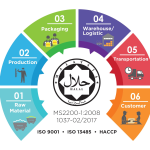Halal denotes the process of “opening a node, unwind, unscrew, unravel, untangle, disentangle, disengage, or resolving something” (Potluri et al., 2017). In Surah al-Maidah (Chapter 5) verse 3, Allah SWT informs the devotees (of Islam) on the types of forbidden food, such as:
“Forbidden to you (for food) are dead meat, blood, the flesh of swine and that on which hath been invoked the name of other than Allah. That which hath been killed by strangling, or by a violent blow, or by a headlong fall, or by being gored to death; that which hath been (partly) eaten by a wild animal; unless ye are able to slaughter it (in due form); that which is sacrificed on stone (altars); (forbidden) also is the division (of meat) by raffling with arrows: that is impiety. That is grave disobedient” (al-Maidah: 3).
The definition of halal is linked with the words permitted, allowed, lawful, and legal (Razak et al., 2015). Halal products are not mixed with prohibited elements, such as pork, alcohol, animal derivatives, and animal-based gelatines. Permitted animals must be slaughtered according to Islamic rules (Rahman et al., 2015). Muslims are required by religious rules to consume halal and clean food (Ali et al., 2018). In other words, the element of halal must be placed together with the element of thoyyib. Practicing halalan thoyyiban in the food industry means that the raw materials used are halal and not mixed with non-halal products during production and distribution (Talib, 2017). Halal practices serve as a life guide for Muslims, including food consumption and lifestyle (Wingett & Turnbull, 2017). By following the rules outlined by the religion (Islam), Muslims can meet the Shariah requirements to improve their quality of life and maintain people’s lives (Othman et al., 2017). According to Halal Malaysia, the definition of halal as asserted in the Trade Description Order (Usage of the Term “halal”) 1975 is as follows:
“When the term is used in relation to food in any form whatsoever, in the process of trade or commerce as an aspect of trading or part of an aspect of trading for the referred to food, the terms ‘halal’, ‘Guaranteed halal’ or ‘Muslims Food’ or any other terms that may be used to indicate or may be understood as meaning to indicate as permissible to be consumed by Muslims and allowed in their religion for the referred to food to be consumed, must therefore mean the following, that is, the food for which such terms are being used: a) does not stem from or consists of any part of or item from animals that are forbidden to Muslims by Islamic law, or animals that have not been slaughtered according to Islamic law; b) does not contain any substance that is considered impure in Islamic law; c) is not prepared, processed or manufactured using equipment or utensils that are not free from impurities”.
From the above definition, the halal item must be free from haram elements, such as un-slaughtered animals, contaminated substances between haram and halal ingredients, and produced with clean utensils and equipment.
In Malaysia, halal standards go through the “competent authorities” (Department of Islamic Development Malaysia or Islamic Religious Council of the States or JAKIM). Halal standards are authorised by the Malaysian Halal Certification Procedure Manual (Domestic) 2020, Trade Description Act 2011 and Trade Description Act 2011, Trade Descriptions (Definition of halal) Order (2011), and Trade Descriptions (Definition of halal) (Amendment) Order (2012). According to Shariah law, a halal product should not be comprised of any part or matter of an animal forbidden for Muslims to consume or animals not slaughtered based on Islamic law (Ishak & Nasir, 2021). In addition, a halal product should not be comprised of anything impure and intoxicating. The product should be safe for usage or consumption and not harmful to health.
Halal products should be prepared and processed using tools that are uncontaminated with prohibited items. They should not come into contact with or be in proximity to any food that does not meet the clauses in the process of preparing, processing, or storing (Halal, 2018). As highlighted by Malaysia’s halal certification, halal encompasses all facets of sanitation, health, and protection, including the supply chain in line with the definition of halalan thoyyiban (halal with purity). The halal food supply chain refers to the handling of halal food items during various phases in manufacturing, purchasing, and customer service. It also includes the contract between buyers and sellers to fulfil Muslim and non-Muslim consumers’ needs (Zulfakar et al., 2014). In this regard, it mimics the “farm to fork” concept that covers all aspects of production, handling, packaging, storing, and retail (Noordin et al., 2014).
There are many halal categories in Malaysia. Pharmaceuticals, cosmetics, transportation and logistics, banking, and finance are just a few examples of halal-certified industries (Mas'ad & Wakil, 2020). As part of the halal financial industry, Islamic banking is a business that has a foundation of religious values and must operate in accordance with Islamic law and not violate Islamic law in all aspects, especially financial aspects (Maharani & Rahmawati, 2021).
As a conclusion, halal industry practice must incorporate the Islamic method of financing into their business operations to meet Islamic principles. This can help to boost halal industry development and economic income significantly when it comes to halal financing resources derived from the adoption of Islamic financing products by Islamic banking institutions.
References
Abd Rahman, A., Asrarhaghighi, E., & Ab Rahman, S. (2015). Consumers and Halal cosmetic products: knowledge, religiosity, attitude and intention. Journal of Islamic Marketing, 6(1), 148–163. https://doi.org/10.1108/JIMA-09-2013-0068
Ali, A., Xiaoling, G., Sherwani, M., & Ali, A. (2018). Antecedents of consumers’ Halal brand purchase intention: an integrated approach. Management Decision. https://doi.org/https://doi.org/10.1108/ MD-11-2016-0785
Hafiz Zulfakar, M., Anuar, M. M., Syazwan, M., & Talib, A. (2014). ScienceDirect Conceptual Framework on Halal Food Supply Chain Integrity Enhancement. Procedia - Social and Behavioral Sciences, 121, 58–67. https://doi.org/10.1016/j.sbspro.2014.01.1108
Halal. (2018). Halal Malaysia Official Portal. http://www.halal.gov.my/v4/index.php?data=bW9kdWxlcy9uZXdzOzs7Ow==&utama=panduan&ids=gp1
Idham Md Razak, Alias, Z., Naszariah, R., Naseri, N., Zamratul, N., Ahmad, A., & Baharuddin, F. N. (2015). Overview of halal products and services in Malaysia and the global market. III(3), 1–9.
Maharani, S. N., & Rahmawati, S. A. (2021). Measuring Islamic Banking Performance Using Islamic Ethics Perspective. Advances in Economics, Business and Management Research, 161(Ciiber 2019), 55–62. https://doi.org/10.2991/aebmr.k.210121.009
Muhammad Shahrul Ifwat Ishak, & Nur Syahirah Mohammad Nasir. (2021). Maqasid Al-Shari’ah in Islamic Finance: Harmonizing Theory and Reality. The Journal of Muamalat and Islamic Finance Research, 18(1), 108–119. https://doi.org/10.33102/jmifr.v18i1.334
Noordin, N., Laila, N., Noor, M., & Samicho, Z. (2014). Strategic Approach to Halal Certification System: An Ecosystem Perspective. Procedia - Social and Behavioral Sciences, 121, 79–95. https://doi.org/10.1016/j.sbspro.2014.01.1110
Othman, B., Shaarani, S. M., & Bahron, A. (2017). The influence of knowledge, attitude and sensitivity to government policies in halal certification process on organizational performance. Journal of Islamic Marketing, 8(3), 393–408. https://doi.org/10.1108/JIMA-09-2015-0067
Potluri, R. M., Ansari, R., Khan, S. R., & Dasaraju, S. R. (2017). A crystallized exposition on Indian Muslims’ attitude and consciousness towards halal. Journal of Islamic Marketing, 8(1), 35–47. https://doi.org/10.1108/JIMA-01-2015-0005
Syazwan Ab Talib, M. (2017). Motivations and benefits of halal food safety certification. Journal of Islamic Marketing, 8(4), 605–624. https://doi.org/10.1108/JIMA-08-2015-0063
Wingett, F., & Turnbull, S. (2017). Halal holidays: exploring expectations of Muslim-friendly holidays. Journal of Islamic Marketing, 8(4), 642–655. https://doi.org/10.1108/JIMA-01-2016-0002










